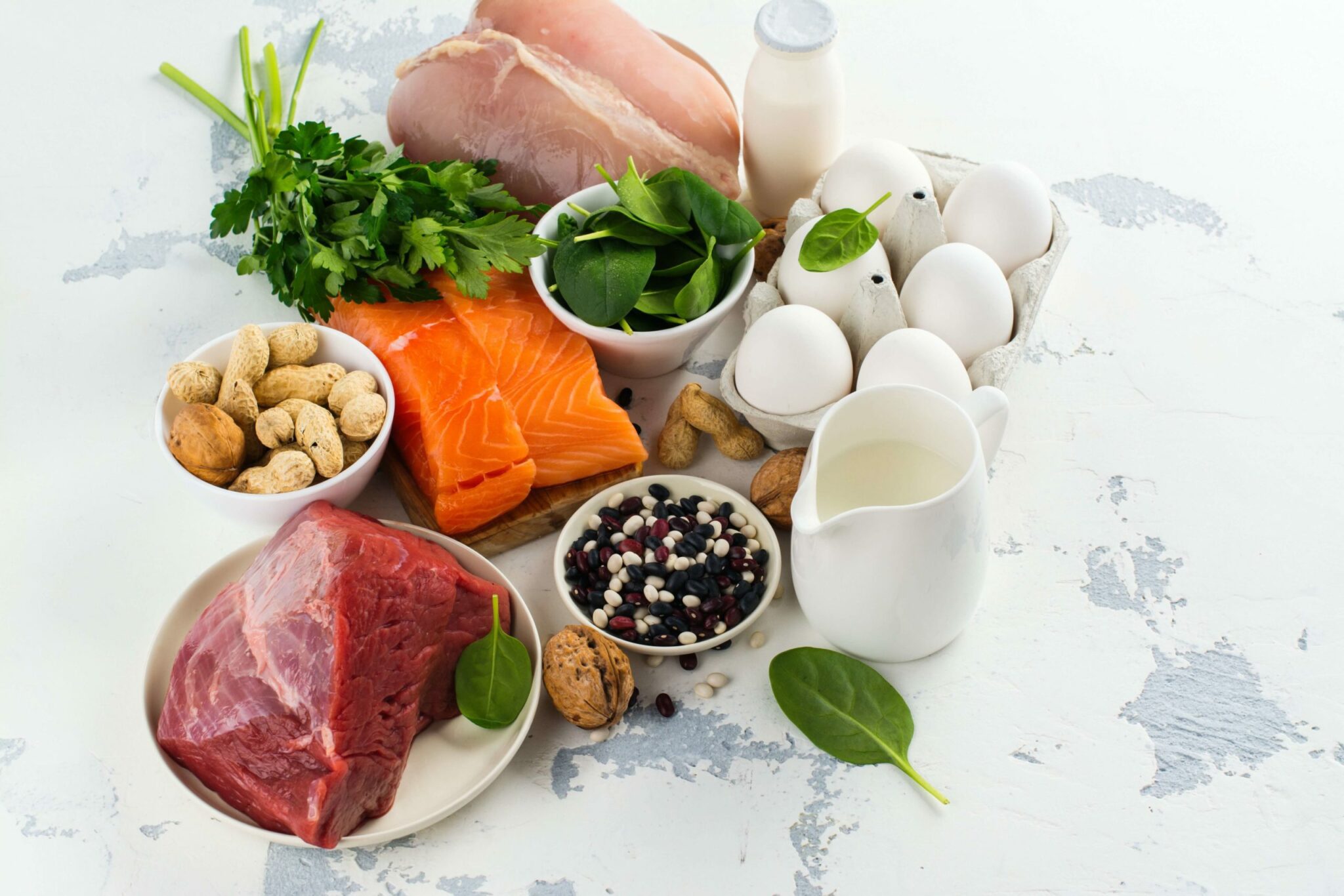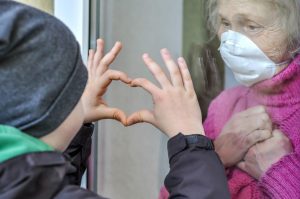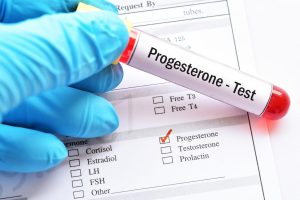Which Foods Help With Hair Loss?

Hair is made from a protein called keratin. It is attached to the scalp via follicles and each person has between 100,000 and 350,000 strands of hair. Each hair strand will grow for approximately 1000 days before entering a resting phase of about 100 days, after which it is shed and replaced with a new hair. This pattern of growth and loss varies from person to person and can be impacted by age, diet and overall health. If the rate at which old hair is being shed exceeds the production of new hair then a person may experience hair thinning, or loss.
What causes hair loss?
A number of factors and medical conditions can influence hair growth. These include:
- Thyroid disease. Having either an underactive thyroid (hypothyroidism) or an overactive thyroid (hyperthyroidism) can have a detrimental effect on hair condition and growth. The thyroid gland produces thyroid hormones, which regulate the use of energy. When levels of thyroid hormone are low, the hair becomes dry and thin; when thyroid hormone levels are high, the hair becomes fine and brittle.
- Chemotherapy. Up to 65% of people who undergo chemotherapy will experience at least some hair loss, usually due to the drugs they are taking targeting the rapidly dividing cells of the hair follicles. This can be a particularly traumatic experience for women, with up to 47% saying it was the most daunting aspect of their treatment. Unfortunately, to date, there are no pharmacological options for preventing this form of hair loss.
- Hormones. An excess of male hormones (androgens) can result in female hair loss. Androgen excess is one of the predominant symptoms of polycystic ovary syndrome (PCOS); thus women with the condition may notice that they are experiencing male-pattern baldness. Women who take an oral contraceptive pill that contains a progestin with a high androgen index (i.e. levonorgestrel) are also at increased risk of hair loss.
- Diet. Repeatedly losing and regaining weight, or following fad diets, can impact the health of the hair; particularly at times when the diet is lacking essential vitamins and minerals. A reduced intake of carbohydrates can cause hair loss.
This list is not exhaustive. There are other medical conditions and medications that can affect the normal hair growth cycle; as well as lifestyle factors, such as stress and age. Appropriate medical advice should be sought for all suspected medical issues. However, taking some time to appreciate and consider what you are eating, will not only be beneficial for your overall health, but should also help to improve the appearance and condition of your hair.
Best Vitamins for Hair Growth and Thickness
#1 – Protein. As the main constituent of hair is protein, having sufficient levels of it in the diet is very important. If protein levels are low, the hair becomes weak, dry and brittle. Foods high in protein include chicken, fish, dairy, eggs, legumes and nuts.
#2 – Iron. Healthy hair requires a nutrient-rich blood supply. Low iron levels (serum ferritin < 50 ng/mL) mean that less nutrients are supplied to the hair follicle, which reduces growth and may cause increased hair shedding. Iron deficiency is a major worldwide problem, with up to 30% of the world’s population thought to be anaemic. Iron can be found in red meat and fish, as well as in lentils, spinach and green leafy vegetables.
#3 – Vitamin C. Aids with the intestinal absorption of iron, as well as acting as a powerful antioxidant, protecting from free radical-induced damage. It also helps with collagen fibre production, strengthening the capillaries that supply the hair follicles. Vitamin C is found in oranges, sweet potato, blackcurrants, blueberries and broccoli.
#4 – Vitamin A. A well-balanced diet will normally provide sufficient vitamin A and over-supplementing this vitamin can actually contribute to hair loss. A healthy intake from orange and yellow vegetables rich in beta carotene (carrots, pumpkins, sweet potato) aids with the production of sebum from the sebaceous glands. This oily substance acts as a natural conditioner, preventing dryness and itchiness of the scalp.
#5 – Omega-3. The body is unable to produce omega-3, so it must be absorbed through the diet. It helps to keep the hair hydrated and is found in oily fish, such as salmon, avocado, pumpkin seeds and walnuts.
#6 – Zinc. One of the physical signs of zinc deficiency is hair loss, and as this is another example of an element that the body cannot produce, it is important to get adequate supplies from the diet. Zinc is found in fortified cereals and wholegrains, as well as beef and eggs.
#7 – Vitamin D. Patients with vitamin D-dependent rickets often experience hair thinning. Most experts agree that vitamin D supplementation helps people with hair loss. The majority of vitamin D comes from exposure to the sun; however, in some parts of the world, including the Middle East, over 80% of people are thought to be deficient in the vitamin. Alternative supplies can come from consumption of salmon, sardines, canned tuna and cod liver oil. Egg yolks and mushrooms are also sources of dietary vitamin D.
The take home message is that what we eat can directly improve the health of our hair and consuming a well-balanced diet, rich in micronutrients is essential for strong, well hydrated hair. The ideal scenario for most people, is to eat a diet rich in vitamins and minerals. However, in some cases, additional supplementation may be required. For those who have experienced hair loss due to chemotherapy, the rapidly dividing cells that line the gastrointestinal tract may be just as susceptible to damage as the hair follicles, minimising the ability of the gut to adequately absorb nutrients. In these instances, supplementation may be a viable option whilst the GI tract recovers.
Nabta is reshaping women’s healthcare. We support women with their personal health journeys, from everyday wellbeing to the uniquely female experiences of fertility, pregnancy, and menopause.
Get in touch if you have any questions about this article or any aspect of women’s health. We’re here for you.
Sources:
- Almohanna, H M, et al. “The Role of Vitamins and Minerals in Hair Loss: A Review.” Dermatology and Therapy, vol. 9, no. 1, Mar. 2019, pp. 51–70., doi:10.1007/s13555-018-0278-6.
- Briden, L. “9 Things to Know About Female Hair Loss.” Lara Briden – The Period Revolutionary, 27 Jan. 2015, www.larabriden.com/things-to-know-about-female-hair-loss/.
- Haq, A, et al. “Vitamin D Deficiency: A Single Centre Analysis of Patients from 136 Countries.” The Journal of Steroid Biochemistry and Molecular Biology, vol. 164, Nov. 2016, pp. 209–213., doi:10.1016/j.jsbmb.2016.02.007.
- Lewin, J. “What to Eat for Healthy Hair.” BBC Good Food, www.bbcgoodfood.com/howto/guide/what-eat-healthy-hair. Last reviewed on 28 June 2018 by nutritionist Kerry Torrens.
- Moore, K. “What Causes Hair Loss?” Healthline, www.healthline.com/symptom/hair-loss. Medically reviewed by Steve Kim, MD on February 29, 2016.
- Trost, L B, et al. “The Diagnosis and Treatment of Iron Deficiency and Its Potential Relationship to Hair Loss.” Journal of the American Academy of Dermatology, vol. 54, no. 5, May 2006, pp. 824–844., doi:10.1016/j.jaad.2005.11.1104.
- Trüeb, R M. “Chemotherapy-Induced Hair Loss.” Skin Therapy Letter, vol. 15, no. 7, 2010, pp. 5–7.










